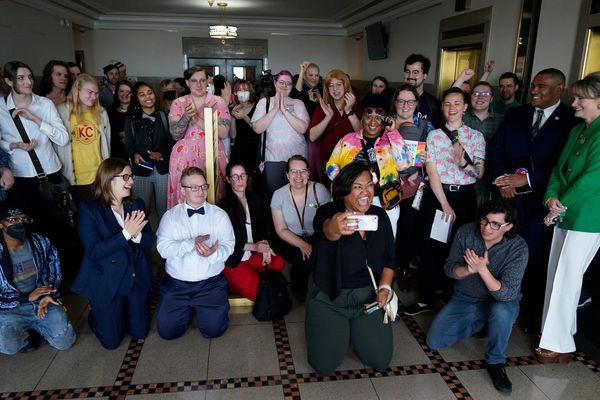WASHINGTON _ Many Democrats see Joe Biden as a voice of ideological restraint in a party rapidly moving to the left.
But the 2020 Democratic front-runner's emerging policy agenda is anything but moderate _ at least compared to the party's last presidential nominee.
From health care to climate change to criminal justice, Biden has proposed ideas more ambitious and liberal than policies supported by Hillary Clinton in the 2016 campaign, a McClatchy review of the candidates' platforms found.
Taken as a whole, Biden's policy platform represents a significant shift from Clinton's. On nearly every major issue, Biden has either exponentially increased the scope of what Clinton proposed or advocated for new ideas that most Democrats would have up until recently considered fringe.
The former vice president's embrace of an unabashedly liberal agenda cuts against some perceptions of him, both from progressives who criticize Biden as insufficiently bold and center-left allies who argue he can appeal to voters in the middle against in an election against Donald Trump.
But for a candidate who has generally kept within his party's mainstream during his five-decade career, it also underlines just how much _ and how rapidly _ the Democratic Party has changed in the three years since Clinton was its standard bearer.
"There's no doubt people like Joe Biden are moving with the times in our party, and our party has moved to the left," said Matt Bennett, co-founder of the center-left think tank Third Way. "You'd have to be insane to deny it."
A candidate's policy agenda is far from the only way to assess their ideological views. Biden, for instance, has faced criticism for more conservative positions he took in the past on issues like abortion rights and criminal justice.
And whether voters view a candidate as "liberal" also depends on how they compare to their opponents. In most cases, Biden's agenda isn't as far to the left as Bernie Sanders' or Elizabeth Warren's, and is roughly comparable to other opponents' plans like Kamala Harris or Cory Booker.
Still, Biden's current set of policy prescriptions would likely be considered radical if they had been proposed in any previous Democratic presidential primary. That's especially clear in comparison to Clinton's 2016 platform.
On health care, Clinton proposed offering a public insurance plan for Americans enrolled in the health care exchanges established by the Affordable Care Act. She also wanted to let adults older than 55 buy into Medicare.
Biden's plan goes much further: He wants to allow all Americans _ including those receiving insurance through their employer _ to buy into a government-backed insurance plan, a shift some progressives have said would represent an enormous change to Obamacare. (Biden also proposed significantly increasing the subsidies available to those who enroll in the public option.)
There's also a wide disparity between Biden and Clinton's climate change plans. Clinton proposed spending $60 billion on clean-energy fund as part of an attempt to make the U.S. 80% carbon-free by 2050; Biden wants to spend $1.7 trillion in federal money to make the country emit a net of zero carbon emissions by 2050.
"Joe Biden's climate plan _ I'm going to get canceled for this _ is quite ambitious," said Sean McElwee, co-founder of the liberal group Data for Progress.
Biden is also pushing to triple Title I funding for schools that educate low-income students, and to abolish the federal death penalty while encouraging states to do the same. Clinton wanted to preserve capital punishment in certain situations.
One of Biden's most prominent criminal justice reform proposals _ a $20 billion initiative that encourages states to reduce their prison populations in part by removing mandatory minimums for non-violent crimes _ also represents a new kind of plan from a major presidential candidate, according to Lauren-Brooke Eisen, acting director and senior fellow for the Justice Program at the Brennan Center for Justice.
"The candidates are all realizing they need to focus on ending mass incarceration, reducing racial disparities, ensuring more dollars are used on prevention and education than incarceration," Eisen said. "There's a wholesale recognition among leading Democratic candidates that incarceration has not made us safer; it ruins lives."
Liberal policy experts say Biden's robust agenda is a reflection of a Democratic Party that has shifted decisively to the left since Trump's election. Policies that would have been widely considered radical at the end of Barack Obama's presidency are now commonplace, forcing even veteran politicians like Biden to recalibrate.
But experts are also quick to add that they think Biden's agenda is also reflective of a recent shift in the policy community about the scope and severity of the problems facing both the U.S. and the world. On the environment, for example, they note that proposals naturally become more aggressive after the Intergovernmental Panel on Climate Change issued a new report in 2018 that warned the effects of a rapidly warming earth would be worse than expected.
In other cases, candidates are responding directly to proposals from the Trump administration that didn't exist when Clinton ran in 2016.
"The 2016 agenda was in many ways about consolidating and building on the achievements of the Obama administration and taking on some of the unfinished business of the Great Recession," said Jacob Leibenluft, an executive vice president of policy at the think tank Center for American Progress. "And what we see now is an attempt to do all that, but also considerably more, reflecting a greater consensus about what it takes to not only undo the damage that Trump has done, but really address the challenges that have existed in the country for several decades."
"The election of Donald Trump changed the perception of what was politically possible, and created new openings for ambitious ideas," added Leibenluft, who was a senior policy adviser on Clinton's 2016 campaign.
Biden has still faced plenty of criticism from the left for his policies. Shortly after beginning his campaign, he was forced to reverse his previous support for the so-called Hyde Amendment, which banned federal funding for abortions.
Progressive critics have also focused less on Biden's proposed plans for changes to the criminal justice system than his support for the 1994 crime bill, which they blame for creating a system of mass incarceration.
The debate within the Democratic primary has also focused on how candidates plan to pass their agenda through Congress. On this front, Biden has been more hesitant to embrace sweeping structural changes, such as eliminating the legislative filibuster in the Senate or adding seats to the Supreme Court.
"If you're not prepared to add seats to the Supreme Court, add Puerto Rico as a state, twist those arms, you're not going to get any of those climate policies because you're going to let Mitch McConnell determine your climate change policy," McElwee said.
Biden's message to voters doesn't always emphasize his agenda, either, choosing instead to promote his strength as a candidate against Trump or highlighting his close relationship with Obama. One of Biden's TV ads in Iowa for instance, highlights his plans to protect the Affordable Care Act while criticizing candidates who wish to replace it with a new system.
Warren and Sanders have each backed a plan that would replace the ACA with a single-payer system.
Biden's message heartens some center-left Democrats who fear the party will face consequences in the general election if it moves too far to the left.
"Our view on policy is that it serves as a kind of superstructure of the campaign and not the exterior," Bennett said. "The narrative and the message is what people react to."







